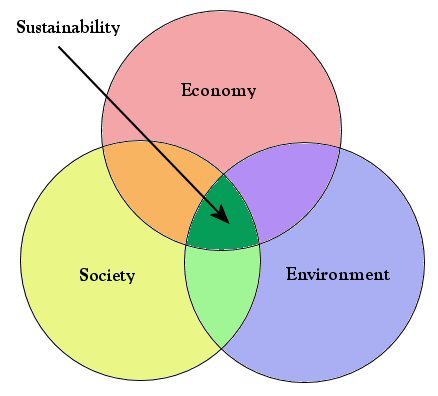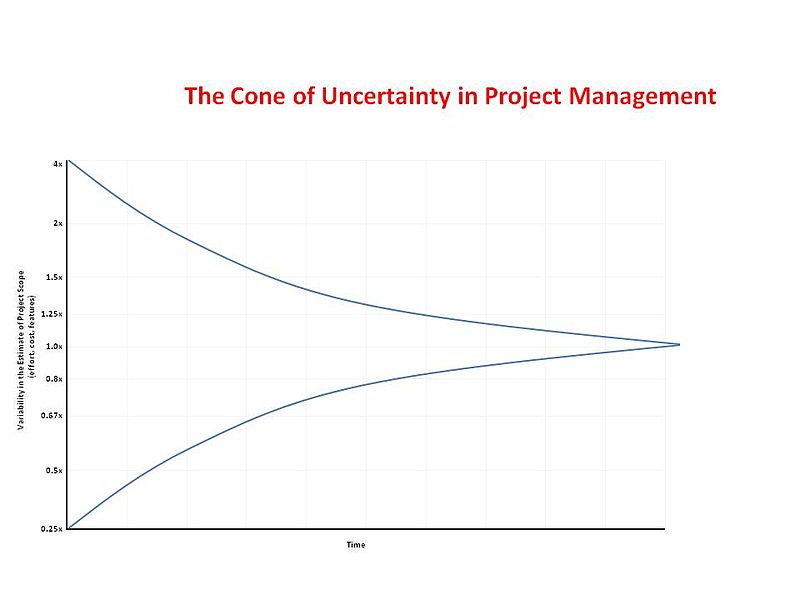
A "hobo" clown at heart, down on my luck (previously but not now), but eternally optimistic :o)
Sep 30, 2012
Sep 29, 2012
Project Uncertainty
There are four types of Uncertainty in Projects
Variation - comes from many small influences and yields a range of
values on a particular activity
Foreseen Uncertainty - are identifiable and understood influences
that the team cannot be sure will occur
Unforeseen Uncertainty - can’t be identified during project planning
Chaos - projects subject to unforeseen uncertainty start out with
reasonably stable assumptions and goals, projects subject to chaos do not. Even
the basic structure of the project plan is uncertain, as is the case when
technology is in upheaval or when research, not development, is the main goal.
These ideas are from the work of Arnoud De Meyer, Christoph H. Loch and Michael T. Pich in the MIT Sloan
Management Review, WINTER 2002. Their work can also be found at www.insead.edu.
Sep 28, 2012
CA High-Speed Rail
For years now, the plans for a high-speed rail network in California have been out there, inching forward slowly with occasional financial roadblocks along the way. But now it looks like the first phase will actually start construction soon as a measure to raise funding through a municipal bond sale has passed in the California state legislature. A recent vote approved the bond sale that will raise $4.5 billion total, with $2.6 billion of that going toward the initial stretch of the rail network. That first phase will be a 130-mile section that connects Madera and Bakersfield in the state's Central Valley. The next phase will be to connect Los Angeles and San Francisco with trains traveling at 220 mph, and then ultimately span all the way from San Diego to Sacramento. The network will include major stops in between and connect into existing railway infrastructure. The bond sale also includes $1.9 billion for improvements to regional rail networks like electrifying the Caltran San Jose - San Francisco commuter line.
Sep 27, 2012
Rich or Poor?
Sep 26, 2012
Sustainability
 When EarthPM was founded, it was based
on 5 Assertions, which we have updated
slightly:
When EarthPM was founded, it was based
on 5 Assertions, which we have updated
slightly:
1. Doing the right thing helps the project
team do things right.
2. Adding sustainability thinking in PM helps better equip you and
your team respond to project risks.
3. Sustainability thinking added to PM helps the project and the
product of the project.
4. An environmental lens is a necessary part of a PM’s toolbox.
5. Greenality, like quality, must be
planned in, not bolted on.
Source
Sep 25, 2012
Delegate
You have way too much to do, you're buried in work, and it seems
there's no way out from under it all. But there is: delegation…
 What the Experts Say
What the Experts SayDelegation is a critical skill. "Your most important task as a leader is to teach people how to think and ask the right questions so that the world doesn't go to hell if you take a day off." Delegation benefits managers, direct reports, and organizations. Yet it remains one of the most underutilized and underdeveloped management capabilities.
Watch for warning signs
You may not realize that you're unnecessarily hoarding work. There are warning signs, however. "A classic sign of insufficient delegation is that you are working long hours and feel totally indispensable, while your staff isn't terribly energized and keeps strangely regular hours.
You may not realize that you're unnecessarily hoarding work. There are warning signs, however. "A classic sign of insufficient delegation is that you are working long hours and feel totally indispensable, while your staff isn't terribly energized and keeps strangely regular hours.
Understand why you're not delegating
There are plenty of reasons why managers don't delegate. Some are perfectionists who feel it's easier to do everything themselves, or that their work is better than others'. Some believe that passing on work will detract from their own importance, while others lack self-confidence and don't want to be upstaged by their subordinates. Giving up being 'the go-to expert' takes tremendous confidence and perspective even in the healthiest environments. Accepting that you can't do everything yourself is a critical first step to delegating.
There are plenty of reasons why managers don't delegate. Some are perfectionists who feel it's easier to do everything themselves, or that their work is better than others'. Some believe that passing on work will detract from their own importance, while others lack self-confidence and don't want to be upstaged by their subordinates. Giving up being 'the go-to expert' takes tremendous confidence and perspective even in the healthiest environments. Accepting that you can't do everything yourself is a critical first step to delegating.
Choose the right people
Some managers fear delegation because they've been burned in the past. It's important that you pass on work to people who have the necessary skills and are motivated to get the job done right. Ideally, you should be able to delegate some form of work to everyone on your team. If you push work as far down the hierarchy as possible, you will free up time and help all your staff members grow.
Some managers fear delegation because they've been burned in the past. It's important that you pass on work to people who have the necessary skills and are motivated to get the job done right. Ideally, you should be able to delegate some form of work to everyone on your team. If you push work as far down the hierarchy as possible, you will free up time and help all your staff members grow.
Integrate delegation into what you already do
Delegation shouldn't be yet another task. Make it part of your process for creating staff development plans. Discuss which types of projects and tasks you will pass on to them so that they can build the skills they need.
Delegation shouldn't be yet another task. Make it part of your process for creating staff development plans. Discuss which types of projects and tasks you will pass on to them so that they can build the skills they need.
Ask others to hold you accountable
Give your direct reports permission to call you out when you haven't delegated something you should. Also, let them know that they're responsible for their own growth and if they see a project they want to take on, they should ask for it.
Really let go
After you delegate, your job as a manager is to observe and support your direct reports, not dictate what they do. Develop their critical thinking skills so they become better at intervening in their own situations. Give your employees space. Be careful though. It's possible to be too hands off. Don't walk away from a task you've delegated. Stay involved but let your employee lead the way.
Give your direct reports permission to call you out when you haven't delegated something you should. Also, let them know that they're responsible for their own growth and if they see a project they want to take on, they should ask for it.
Really let go
After you delegate, your job as a manager is to observe and support your direct reports, not dictate what they do. Develop their critical thinking skills so they become better at intervening in their own situations. Give your employees space. Be careful though. It's possible to be too hands off. Don't walk away from a task you've delegated. Stay involved but let your employee lead the way.
Learn from experience
Once you've started delegating more, pay attention to the results, and learn from your mistakes. Ask yourself how you can tweak your approach. Can you delegate more involved tasks? Should you give your direct reports more freedom? Do you need to monitor progress more closely? Be patient with yourself while you practice.
Once you've started delegating more, pay attention to the results, and learn from your mistakes. Ask yourself how you can tweak your approach. Can you delegate more involved tasks? Should you give your direct reports more freedom? Do you need to monitor progress more closely? Be patient with yourself while you practice.
Sep 24, 2012
Sep 23, 2012
Sep 22, 2012
Levitating Lights
A 19-year old electrical engineering student at the University of
Queensland in Australia has created a
levitating light bulb that is not an optical
illusion. While it may not look too sexy in this photo, just wait until
you see these LevLights floating around your
ceiling in designer glass shades.
Chris Rieger, who is already
working on a new and improved version of the LevLight, will not have to worry
about manufacturing and marketing his invention; Bulb America, whose motto is, 'If it lights, we have it," has snapped up the
opportunity to commercialize it.
Source
Source
Sep 21, 2012
Stressed?
 The same reason most of us get stressed: frustrated expectations.
Rob had an important call to make and his cell phone wasn't working. He was
experiencing the gap between what he expected to happen and what was actually
happening. That's the underlying cause of stress and it's afflicting us
more these days than ever because our expectations keep rising, thanks in part
to exponential improvements in our technology.
The same reason most of us get stressed: frustrated expectations.
Rob had an important call to make and his cell phone wasn't working. He was
experiencing the gap between what he expected to happen and what was actually
happening. That's the underlying cause of stress and it's afflicting us
more these days than ever because our expectations keep rising, thanks in part
to exponential improvements in our technology.So what can you do about the stress and frustration that comes from unmet expectations? You have two choices: Either change the reality around you or change your expectations.
Trying to change reality isn't usually a stress reliever, it's a stress creator. A small thing — like changing a seat on an airplane — can be such a pain that even if it works it's often not worth the struggle. And the bigger things — like getting more accomplished in a day — can be even more frustrating.
Which leaves us with the best strategy for reducing stress: Change your expectations. In other words, get used to not getting what you want. I know this isn't consistent with the kind of go-get-'em attitude most of us have been taught to embrace. But most of the time, fighting reality is not worth the effort. Either you can't change what's around you, or the fight is more stressful than the reward. If changing your expectations proves too hard, your next best move is to get some perspective.
Imagine a scale from 1-10 with 10 being the worst reality you can imagine. Like living in a war zone or being in the World Trade Center on 9/11. Maybe 9 is a serious illness that most probably will result in death. Perhaps 8 is something that will forever alter your life, like going to jail or an accident that puts you in a wheelchair. Let's say 7 is something that temporarily alters your life like losing your job or having to move out of a home you can no longer afford.
Almost everything we freak out about is somewhere in the 1-2 range of dashed expectations. In other words, our moods and our stress levels are determined by events that actually matter remarkably little.
So sit back, take a deep breath, and put things in the proper perspective.
Source
Sep 20, 2012
PMO Success Factors
While there are numerous contributors to success, there are three
that are essential:
Alignment of management expectations with the:
PMO reporting level and authority
PMO services and expected results
Number and skill level of the PMO staff.
An organizational charter communicating the PMO's services and
authority to the potential users of its services.
Results that demonstrate value to the business in the first:
One hundred days
Six months
Sep 19, 2012
Talk Like A Pirate Day! Arrrrrgggg :o)
Talk
Like A Pirate Day
What's
new?
 We
can hardly believe it, but 2012 marks the 10th anniversary of the worldwide
celebration of International Talk Like A Pirate Day.
We
can hardly believe it, but 2012 marks the 10th anniversary of the worldwide
celebration of International Talk Like A Pirate Day.
We
may have come up with the idea, but it's all of you who keep it going year
after year, giving our crazy idea way more than its 15 minutes of fame.
We're
hoping for the best September 19th ever - and the fact that it falls midweek
means you can celebrate the whole week long if you like! In fact, the first
reported Talk Like A Pirate Day parrrrty of
2012 happened on Sept. 12, in Tasmania - and we've heard of festivities carryin' on
into October!!) Stay tuned, and subscribe to The Poopdeck, by email or via our
RSS feed, for
news as it develops! Meanwhile, check out the GooglyMapThing,
below, or our calendarrrrr for
events near you!
Sep 18, 2012
Sep 17, 2012
No Regrets!
Sep 16, 2012
Sep 12, 2012
Evansville, IN bound for four days...
Sep 11, 2012
Existence
Sep 10, 2012
New Chapter Day 1
 All in all, a good first day. A welcome breakfast that the executives and engineering team members attended, followed by a walk around an meet lots of people, filling out the new HR paperwork, logging into the new computer, lunch with my new boss, getting chargers for my new iPhone, a physical and drug test, and my first manager staff meeting with engineering. No regrets and only positive things to say!
All in all, a good first day. A welcome breakfast that the executives and engineering team members attended, followed by a walk around an meet lots of people, filling out the new HR paperwork, logging into the new computer, lunch with my new boss, getting chargers for my new iPhone, a physical and drug test, and my first manager staff meeting with engineering. No regrets and only positive things to say!
Sep 9, 2012
Change Is Good!
 A mostly quiet Sunday, after a busy few days and an emotional roller coaster.
A mostly quiet Sunday, after a busy few days and an emotional roller coaster. Spent the morning on the interwebz getting caught up on stuff, then watched Da Bears!
After that it was out to get a mini-workout in, mow the lawn, and get my Mayorship for Nutwood Outback back from Matt :o)
Then it was a relaxing shower and getting into the mindset for starting the new job tomorrow. I am beyond excited and am really looking forward to the start of this new chapter. I am pleased to know that I have some friends that are looking forward to sharing this journey with me.
The Boss & ND Squeaks Out A Win

 All in all, it has been a great few days. Since I am jobless for three days, we headed to the Windy City to be with family and friends and take in the Boss at Wrigley Field. It was a great show!
All in all, it has been a great few days. Since I am jobless for three days, we headed to the Windy City to be with family and friends and take in the Boss at Wrigley Field. It was a great show! Then we headed back to South Bend this morning and grabbed a bite to eat and headed to ND Stadium for the first home game. They seemed a bit off their stride, but managed to kick the winning field goal with one second left.
Tomorrow will be mowing the lawn and just some general chilling.
Hope you had a nice weekend.
Sep 8, 2012
Communication!
 Communication is 80%-90% of the time a Project Manager
spends their time on. So what are some of the problems that can occur within a
project team?
Communication is 80%-90% of the time a Project Manager
spends their time on. So what are some of the problems that can occur within a
project team?Vertical flow. Communication both up and down stops working. When there’s a vacuum in the information, we know how people will fill it - with their imagination. In the upward direction, workers on a problem project quickly become conditioned not to escalate problems. Consequently, important status stops flowing up and problems go unmanaged.
Horizontal flow. Part of the team is not talking to another, or at least not routinely coordinating as they should. Sometimes it’s because one or two people are on a power trip. Sometimes, their team members don’t get along. Sometimes on matrixed teams, the functional managers are in conflict which manifests itself as dysfunction on the project team.
Skill deficit. Not everyone is born with a gift for communication. Most people can develop it given the chance. Some people might never get good at it. I have seen teams where underdeveloped communication skills simply get in the way.
Morale. If a team is demoralized, it is simply difficult for people to find the energy to go the extra distance and make sure communications are timely, accurate, and relevant. Once people are emotionally checked out, all the soft skills suffer.
Cultural inhibitions. The organization’s culture can impede good communication. Sometimes managers routinely withhold information as a source of power and control (aka “mushroom management”). Aggressive companies typically reward success and punish failure to a fault which encourages dysfunctional competition within a team.
What are some of the tools that can be used to improve communication?
Daily team meetings. This can help not only the vertical flow of information but horizontal. Everyone becomes more attuned to people they need to coordinate with and, even more importantly, why. Target is 10 – 20 minutes.
Coordination meetings. Coordination meetings can simplify communication by giving people direct involvement with what is said and how it is said. It’s our job as project managers to pay attention and end coordination meetings when they are not needed.
Open door policy. Do it, mean it!
Replace the irreplaceable. Sometimes you may need to remove a disruptive team member from the project.
Put culture in the open. Recognizing different assumptions and expectations during a meeting can become routine and even a light diversion.
Whatever you expect of the team, management stakeholders, the sponsor, the vendors, the customers, etc., you must do the same first. You must walk the talk. If you don't, you are a hypocrite. Follow your own advice or you won't get the results you need.
Source
Sep 7, 2012
Humble Pie!
 I am humbled by the turnout for my going away gathering tonight. At one point we consumed more than nine tables at Wheatberry's Restaurant. They have great food and suds, and we had a great time. I have to admit I got choked up twice, first when my Director called me up to give me accolades and wished me luck, and second when I had to say my final goodbyes as we left. I am not ashamed to say that I had tears and sniffles most of the way home. Sigh...
I am humbled by the turnout for my going away gathering tonight. At one point we consumed more than nine tables at Wheatberry's Restaurant. They have great food and suds, and we had a great time. I have to admit I got choked up twice, first when my Director called me up to give me accolades and wished me luck, and second when I had to say my final goodbyes as we left. I am not ashamed to say that I had tears and sniffles most of the way home. Sigh...Leaving the people was the hardest part, but with my wife and best friend by my side, we will enter into our new chapter. Love you Cook Projects, I may not be physically present, but I will always be there in spirit.
Sep 6, 2012
Philosophical Phun - Social Privacy
 Consider this scenario: A twenty-something male standing outside of
the supermarket talking loudly on his cell phone making no attempt to hide his
conversation. He is so loud and animated that you can tell he is angry with his
significant other. Dollar-to-a-donut that you have experienced something similar
and that it is painfully uncomfortable. Why do these situations seem to occur
more frequently today?
Consider this scenario: A twenty-something male standing outside of
the supermarket talking loudly on his cell phone making no attempt to hide his
conversation. He is so loud and animated that you can tell he is angry with his
significant other. Dollar-to-a-donut that you have experienced something similar
and that it is painfully uncomfortable. Why do these situations seem to occur
more frequently today?As with most other topics, philosophers have not always agreed on the scope of privacy. However, most have agreed that privacy is a good or a right (privacy referred to here pertains to personal and social relationships not to the legal and constitutional aspects of privacy). With the exception of Plato and Aristotle (they viewed privacy as a negative concept), philosophers generally have promoted privacy as a necessary component for a prosperous and happy society. In social relationships, privacy allows one to “control who knows what about us and allows us to vary our behavior with different people so that we can maintain and control our various social relationships.”
Although it is a challenge to find a single definition that encompasses all we might care about when it comes to privacy, most people have enough strong intuitions about the subject that they argue in its favor and deem privacy to be a positive moral value. There seems to be something intuitive and urgent about privacy that it invokes a sense of discomfort in us when it is violated. The ability to control which details of our lives should be disclosed is something that people cherish and deem to be significant in forming and maintaining relationships.
Sep 5, 2012
West Coast Chill
 Twenty years ago,
Mitchell Joseph set out to solve one of the great challenges of the modern
age: how to make a can of beer that could cool itself. He designed a can that
used and released the coolant HFC-134a. His prototype worked—it cooled liquid dramatically
in a matter of minutes—but there was a hitch. HFC-134a is a greenhouse gas
1,400 times as potent as carbon dioxide. Popping one of Joseph’s cans was the
environmental equivalent of driving 500 miles, and it was illegal under EPA
regulations. Suffice it to say, his original design never made it into
production. This year, Joseph introduced the ChillCan, a completely legal self-chilling can that reduces a
drink’s temperature by 30ºF in three minutes.
Twenty years ago,
Mitchell Joseph set out to solve one of the great challenges of the modern
age: how to make a can of beer that could cool itself. He designed a can that
used and released the coolant HFC-134a. His prototype worked—it cooled liquid dramatically
in a matter of minutes—but there was a hitch. HFC-134a is a greenhouse gas
1,400 times as potent as carbon dioxide. Popping one of Joseph’s cans was the
environmental equivalent of driving 500 miles, and it was illegal under EPA
regulations. Suffice it to say, his original design never made it into
production. This year, Joseph introduced the ChillCan, a completely legal self-chilling can that reduces a
drink’s temperature by 30ºF in three minutes.
The ChillCan contains a cylindrical
chamber of high-pressure CO2 gas, which ends in a
valve that extends through the base of the can and is capped by a button. When
the user pushes the button, the valve opens and the CO2 rushes out of the
bottom of the can and into the air. As the gas expands, it absorbs heat from
the surrounding liquid, lowering the temperature.
Along with his can, Joseph is
launching an energy drink called West Coast Chill to put in it. The drink will
be available this summer in Arizona, Nevada, Southern California and online,
and in stores nationally by 2014. Hopefully, beer will be next.
Early pricing is $4 per can, hopefully that will come down as production increases.
Early pricing is $4 per can, hopefully that will come down as production increases.
Sep 4, 2012
Narcissistic Lament...

This really resonated with me, I have been called narcissistic in the past, and as I read through the characterizations I was amazed at how much that IS NOT ME, but definitely matches someone from a dark period in my life :o).
My current work role is to be a mentor, and I have been enjoying it tremendously.
Working with a narcissistic
leader can be terrifying and frustrating – with many wondering how someone so
incapable of developing employees and goodwill can advance within an
organization.
Narcissistic leaders can be characterized by:
•A controlling personality:
rife with arrogance, self-importance, a strong sense of entitlement, a lack of
empathy for others, a pre-occupation with power, a need to feel extremely
special and unique, and a desire for excessive admiration from others.
•Being thin-skinned:
sensitive to perceived disrespect and criticism, suspicious of others,
paranoid, abrasive, and dismissive of others.
•A preference to keep others
at a distance or surround themselves with those only who will agree with them
and their vision.
•A lack of interest in
mentoring others.
•Elevating (or exaggerating)
their accomplishments while minimizing the accomplishments, contributions, and
value of others.
Narcissistic leaders can be
good for organizations, though. They pursue goals aggressively, drive toward
innovation, are highly competitive, have a strong vision, are charismatic
orators, and make bold decisions.
Manage your expectations. If you were hoping to
have a closer relationship with the narcissist, let it go.
Frame your messages wisely. Remember that
narcissists have difficulty being challenged or criticized. If you really want your idea
to be accepted, make the narcissistic leader believe it was his idea all along.
Document carefully. Make sure to clarify
in writing who is responsible for what. When things don’t work out as planned,
narcissistic leaders will blame others before accepting responsibility.
Set clear boundaries. Narcissistic leaders
want what they want when they want it.
Become a cheerleader. Stop hoping in vain
that a narcissistic leader will appreciate you, credit your accomplishments or
be supportive of you or others. Rather, develop your own sense of a job well
done and take every opportunity to celebrate successes — yours and others.
Find fulfillment and
successes outside the workplace. Narcissistic leaders can bring morale down, and repeated
exposure to their negative behaviors can harm anyone’s self-esteem. Low
self-esteem can, in turn, affect relationships and one’s belief in
self-destiny. Find successes outside of work to validate yourself by spending
time with family, setting personal goals (and achieving them), volunteering,
learning something new, mentoring others, building your network outside the
workplace or other activities at which you excel.
Sep 3, 2012
Subscribe to:
Comments (Atom)










